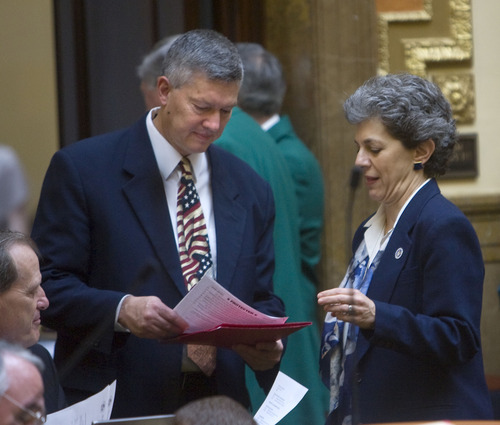This is an archived article that was published on sltrib.com in 2012, and information in the article may be outdated. It is provided only for personal research purposes and may not be reprinted.
Despite offers by Salt Lake City to tweak its anti-idling ordinance more to legislators' liking, a committee advanced a bill Thursday that would kill the ability of cities to have such laws.
The House Business and Labor Committee voted 12-2 to pass HB104 by Rep. Wayne Harper, R-West Jordan, and send it to the full House.
Charlie Luke, vice chair of the Salt Lake City Council, tried to avoid an outright ban of such city ordinances by saying his city is considering changes in its controversial ordinance to calm most legislator complaints about it.
He said the ban on idling for more than two minutes is meant mostly as an educational tool to help reduce pollution, not a means to raise revenue with tickets. He said the city could allow more warnings before issuing tickets to make that clear.
Also, he said it could rework a requirement that taxi and limousine companies replace vehicles with more than 350,000 miles on them or that are more than seven years old. Lawmakers complained older cars sometimes comply just fine with emissions requirements — and Luke said changes could use other measures to remove cars that are heavy polluters.
But Harper said, "I will continue to work with Salt Lake City, and they have continued to work with me. But it is time to pass this bill out" — offering some hope the city could avoid its final enactment if the city passes changes to its ordinance before the Legislature adjourns in a month.
The committee debated the bill for more than 2 1/2 hours on two separate days. It included an appearance in the first hearing by Mayor Ralph Becker, who complained the state is attempting to trample a local government's rights to do what its citizens want.
Rep. Brian Doughty, D-Salt Lake City, echoed that Thursday. "We talk about the federal government putting its hands into the state all the time, and we don't like it. Yet ... it seems time and time again this legislative body resents cities."
Rep. Michael Morley, R-Spanish Fork, said that is justified, however, because states give the cities their power — and it has a responsibility to step in if they try to overreach.
Representatives of cab companies and restaurants — concerned about their drive-through windows — also complained the city's ordinance could hurt their businesses in the debate.
Park City also has an anti-idling law that could be eliminated by the bill.



